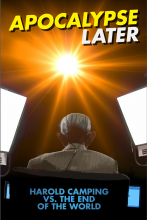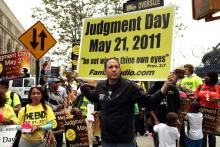Apocalypse

For thousands of years, select groups of Christians have thought their generation was Earth’s last. Even the Apostle Paul thought Jesus would return in his lifetime. But Paul didn’t have the audacity to pinpoint an exact date for what we call the Rapture. Harold Camping, on the other hand, did.
Apocalypse Later: Harold Camping vs. The End of the World a new documentary that premiered June 8 — exposes wrongful and conflicting beliefs about Jesus’ return by sharing Camping’s concrete opinions of those who didn’t follow his beliefs of the apocalypse. Declaring their spot in hell, Camping was certain that those who didn’t follow his apocalyptic views would spend eternity in damnation.
Apocalypse Later tells the story of Camping, a man who had to let go of his pride and face the reality of joining the dozens of others who have wrongly predicted the end of time.
In the documentary, historian and New Testament scholar Loren Stuckenbruck refers to the apocalypse as a “literary genre,” a “mode of thought,” and “a social movement.”
The film is emotional and shocking, contrasting the scary, more literal interpretations of fundamentalist Christians with the more nuanced hermeneutical approaches of academics like Struckenbruck. The juxtaposition reveals that the tensions and battles that Christians face might not be against those who will be “left behind,” but rather between Christians themselves.

What comes into your mind when you hear the word apocalypse? Most of us think of us think of the total destruction of the world, or at least life as we know it. Think zombies roaming the streets, feasting on brains. On the other hand, my sarcastic generation is doing a pretty good job of using apocalypse as a silly word. I remember a few years ago when we had a large winter storm here in Washington, D.C.; it was instantly dubbed Snowpocalypse!
The English word apocalypse derives from the ancient Greek apocalupsis, which is the original title for the infamous Book of Revelation. Revelation involves a lot of fire, smoke, battles, and things generally blowing up, so it’s understandable that today we would associate apocalypse with end-times battles. However, the word apocalypse contains a much deeper meaning. Far more profound than the long-awaited zombie hordes – or even the end-times prophecies of some churchgoers – this ancient, misunderstood word is an essential tool for comprehending the world we live in.
Apocalupsis is a term that means unveiling – as in setting aside a covering to discover what lies underneath. At the most basic level, the Book of Revelation is about removing the blindfold that the Powers have pulled over our eyes, allowing us to see the world as it really is. Revelation is about unveiling Empire, exposing the ways in which powerful interests destroy the earth and enslave other human beings to promote their own luxury and power. Despite its reputation, Revelation is not about a future-oriented, earth-hating vision of universal destruction. On the contrary, it is a vision of a new creation and universal restoration – the world finally set right and edenic harmony restored in the midst of the city.
OK – great, you may be saying. Nice to know, but how is this relevant to me?
Fair question. It’s true that the Book of Revelation was written almost 2,000 years ago. Those were the days of the Roman Empire – think Ben Hur and Spartacus. For sure, things have changed a lot since then.
Yet, the more things change, the more they stay the same.

It seems that America is on the verge of a zombie apocalypse.
First, Ronald Poppo had most of his face eaten off by Rudy Eugene, and now, Alexander Kinyua reportedly killed his roommate, Kujoe Bonsafo Agyei-Kodie and then ate his heart and part of his brain.
Is it just coincidence that this spate of violent attacks comes when the county’s fascination with zombies is at its height, or is there a connection?
From movies to video games, Zombies are the big ticket these days. The undead top the media charts, gnawing and clawing their way into the forefront of our imaginations. Move over vampires; Zombies are the new black.
It’s hard to say if the pop culture popularity has influenced similar copycat killers, or if the zombie craze simply has made us more sensitive to similar real-life stories. Either way, both the fictional tales and actual news items may speak to something going on in our collective imaginations.

Radio evangelist Harold Camping has called his erroneous prediction that the world would end last May 21 an "incorrect and sinful statement" and said his ministry is out of the prediction business.
"We have learned the very painful lesson that all of creation is in God's hands and he will end time in his time, not ours!" reads the statement signed by Camping and his staff and posted on his ministry's website.
"We humbly recognize that God may not tell his people the date when Christ will return, any more than he tells anyone the date they will die physically."
Polaroid camera are back on the market, apocalypse survival guide, Jack Kerouac for bros, the NBA begins using 3D graphics, the hit show Portlandia, James Franco's new film, classic album covers are given a clip art makeover, and more.
Cormac McCarthy’s novels are the Ecclesiastes of postmodern American literature—finely wrought chunks of sparseness in which the protagonists struggle to survive a violent or deadening
I’ve been surfing the Internet, looking for ways to escape the coming apocalypse that ancient Mayans, using science available at the time, predicted for two years from now.